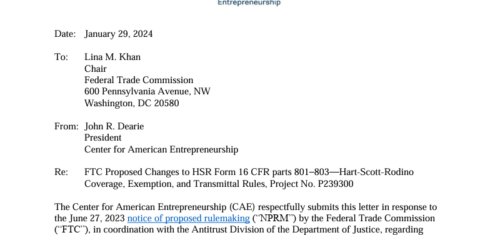Create a Regulatory On-Ramp for Startups
The Congressional Budget Office (CBO) and Office of Management and Budget (OMB) should be directed, by Congress and the Administration, to co-develop a reduced, “light touch” regulatory framework (i.e., a “regulatory on-ramp”) to which new businesses would be subject for the critical first five years after formation. The framework should be comprised of only the most essential product safety, environmental, and worker protection regulations as co-determined by CBO and OMB. Co-development of the framework by CBO and OMB is important since regulation is the implementation of Congressional intent by Executive branch agencies.
To minimize regulatory uncertainty, the new-business framework should also protect new businesses from new regulations for the critical first five years. To be sure, the startup regulatory framework would need to be updated, improved, and refined from time to time by CBO and OMB. But any changes would apply only to new firms the following year and not to young firms already operating within the five-year window of regulatory certainty. To avoid abuse of the regulatory on-ramp – such as business owners simply renaming or reconstituting existing companies every five years – the Internal Revenue Service (IRS), working with the CBO and OMB, should develop appropriate definitions, characteristics, and limitations regarding the meaning of “new business.”
Require Third-Party Review of All Economically Significant Regulations
CBO and OMB should also be directed, by Congress and the Administration, to co-conduct third-party analysis of the economic costs and benefits of all proposed new regulations with an economic impact deemed greater than $100 million. The third-party review should require analysis of the costs of the proposed regulation in relation to other federal regulations, as well as in relation to existing state and local regulations. In particular, the third-party review should focus on the impact of proposed new regulations on new and small businesses. Proposed regulations determined to have economic costs, or costs to new and small businesses, that exceed identifiable benefits should require Congressional approval for enactment.

Create a Regulatory Improvement Commission (RIC)
The federal government has a large, multi-faceted, and very effective apparatus for crafting and promulgating new regulations, but no regular mechanism for systematically addressing outdated, duplicative, ineffective, or unnecessarily burdensome regulations. With this omission in mind, Congress should create a Regulatory Improvement Commission (RIC) as proposed by Michael Mandel, chief economist at the Progressive Policy Institute. Mandel has pointed out that the sheer accumulation of regulations over time can begin to suppress innovation and growth – even if every individual regulation, considered in isolation, is determined to be sound and reasonable.
The problem is that it’s possible for every individual regulation to pass a cost-benefit test, while the total accumulation of regulation creates a heavy burden…The number of regulations matter, even if individually all are worthwhile. I call this the “pebble in the stream” effect. Throw one pebble in the stream, nothing happens. Throw two pebbles in the stream, nothing happens. Throw one hundred pebbles in the stream, and you’ve dammed up the stream. Which pebble did the damage? It’s not any single pebble, it’s the accumulation.
Modeled on the Base Closure and Realignment Commission (BRAC) – which provided independent, objective, nonpartisan review and analysis of U.S. military installations – the RIC ’s purpose would be to serve as a procedural mechanism for the regular evaluation, simplification, streamlining, consolidation, and elimination of selected existing regulations.
The RIC would be comprised of a bipartisan group of highly qualified stakeholder appointees and staffed by experts seconded from various regulatory agencies, Congress, and independent organizations. After selecting a portion of the regulatory code for review – a “scoop” of pebbles from the pile in the stream – the RIC would solicit input from individuals, businesses, other affected stakeholders, and outside experts, hold public hearings, and carefully and objectively examine the evidence in an open and transparent manner.
Upon completion of its analysis, the RIC would submit a package of recommended improvements to Congress for a “fast-tracked” up-or-down vote. Following Congressional approval, the package would be sent to the White House for the President’s approval and signature, ensuring that the reforms carried the force of law.
A Regulatory Improvement Commission would provide a regular and politically feasible alternative to irregular and incoherent deregulation efforts, and would avoid the obvious flaws of regulatory agency self-review that have foiled most deregulatory efforts to date. Moreover, by considering the cumulative impact of regulations across agencies, the RIC would also escape the self-defeating trap of focusing on individual regulations that, considered in isolation, often appear perfectly sound and reasonable. And by requiring Congressional approval by way of a fast-tracked up-or-down vote, the RIC process would provide legislators with the necessary political cover to deliver authentic regulatory reform and simplification, safe from the conflict and interest group pressure that scrutiny of individual regulations often provokes.









